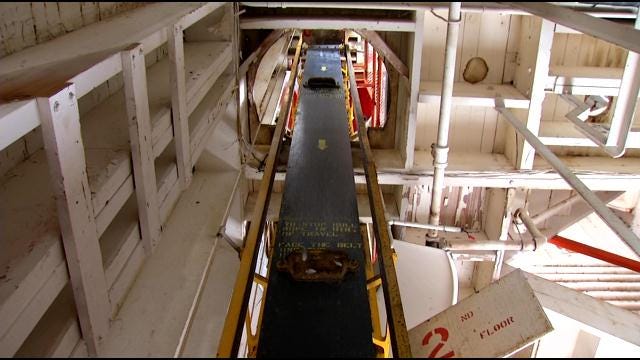Company Giving New Life To 120-Year-Old Blackwell Flour Mill
Life in Blackwell revolved around the flour mill for more than a century. When it was abandoned, it was going to be burned down, until Dean West stepped up with a different idea.Wednesday, July 24th 2013, 10:56 pm
It's safe to say, most people do not want to see a historic building torn down, but there are times when nothing else can be done.
That's the case in Blackwell, in Kay County.
Life in Blackwell revolved around the flour mill for more than a century. When it was abandoned, it was going to be burned down, until Dean West stepped up with a different idea.
Blackwell and the railroad went together like bread and butter--the iron horse carrying in the fruits of the plains to the mill, and carrying out the flour for that bread. For 120 years, wheat was ground there.
Until one day in 2005, that stopped.
One day, there were men racing up and down the elevator and making safety checks--and then there weren't.
One day, the mill was a place of bustle and sweat and pride that another year of toil in the fields would pay the bills--and then it wasn't.
"I don't think anybody would guess that this would be used in restaurants or houses one day," West said.
West sees opportunity in forgotten places filled with cobwebs. He and his crews are taking the mill down to its foundation and putting the pieces to use somewhere else.
Scott Thompson: "So everything in here, almost, is reusable?"
Dean West: "Yes, everything that would be wood's gonna be recycled into either furniture, building products, ceiling treatments, beam treatments in homes, restaurants."
West said he figures there are 250,000 board feet of wood to be salvaged there, maybe 75 tons of steel, 20 tons of copper, and 20,000 square feet of century-old pressed tin siding. A restaurant chain in Washington, DC has already claimed some of that.
West carts all of this to his holding yard in downtown Tulsa, offers it to architects and builders, and waits for their ideas on how they might use it in their projects.
There are 42 massive grain grinders in the old mill. The only way to get them out is through the windows.
West figures they might make interesting table bases in a restaurant somewhere. But that's just his idea. No doubt, there will be others.
Anything that comes out of there comes with a story.
Steam originally powered the mill. At the turn of the 20th Century came electricity. Thomas Edison would recognize the Edison Electric motor there straight-away. It was one of his first.
And a massive motor in the mill ran the leather-strapped flywheels that stretch across the ceiling, powering the place 24/7, for 102 years, before it was finally shut down for maintenance one day.
They don't make these things anymore, which is why there's a comfort in having them around.
"Well, if you ever had seen somebody build a new house and distress a piece of wood, they're after that look. This gives you that old look with a piece of history," West said.
There is still grain on the floor, flour in the gears, rolls of belting hanging from the ceiling, waiting for a workman to come cut a piece and stretch it between the flywheels and fill the place with grain dust again.
But it's just rainwater filling the mill now, and once that started, and wasn't stopped, the old place was doomed.
The original plan was to burn it down, to let the Blackwell Fire Department practice its skills.
But West worked a deal to take it down from the top-down.
"We spent a year planning and valuing this project before we actually signed a contract to move forward," he said.
It's always tough to lose a piece of history, the centerpiece of a town. But when faced with the finality of flames or the chance to give so much of it another life, the Blackwell Flour Mill grinds on in countless new places, in countless new ways.
West has a website where he's offering pieces of the mill for sale.
More Like This
July 24th, 2013
January 2nd, 2025
September 29th, 2024
September 17th, 2024
Top Headlines
January 24th, 2025
January 24th, 2025
January 24th, 2025
January 24th, 2025













